Overclocking
In a quick test, I was able to overclock the 415e from 2.5GHz to 2.95GHz, an 18% increase. This overclock was done by only increasing the bus speed, and not changing any voltages or messing with memory in AMD Overdrive. With some more fine tuning, the 415e should be able to get an over 20% overclock. This overclock puts the 415e slightly higher than the Athlon II X3 435 2.9GHz. Sadly, the 415e does cost more money ($102 vs $76), which doesn’t make this a great buy for overclocking, but it does make it a great by for low-power overclocks, for those in need of a fast, energy efficient machine. I used Cinebench to show the performance difference because it’s a quick test, and I using it to test stability.
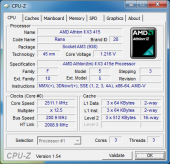 |
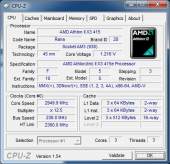 |
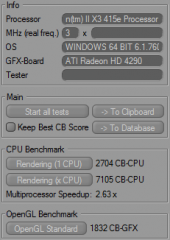 |
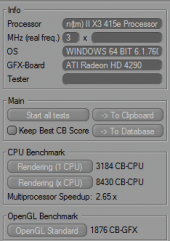 |
| Before – 7105 multi-core |
After – 8430 multi-core |
Conclusion
AMD has really brought out some players in the lower cost space. The Athlon II X3 415e is a fantastic energy efficient CPU. It’s got a lot of power, while using less than half the power of the regular Athlon IIs. Plus, it’s ability to handle a stable 18% overclock is not something that should be left overlooked. Keep in mind though, if you are looking for a lot of performance on a budget, the Athlon II x3 440 3.0GHz is about $80 and is faster out of the box. For power, and energy efficiency on a budget though, I highly recommend this processor. Keep up the great work AMD.

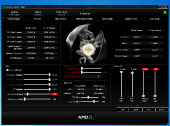
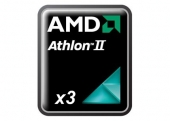

hi buddy… i just wanted to say that my msie is freezing when I click on the pics… are you using some js or something?
yeah there is some JavaScript. Works fine on my Mac 😛
But seriously try using a different browser. IE6 isn’t actually supported by many sites anymore.
This is just blatant PR for AMD. Complete waste of time as a review.
Max Power (I can only assume that is a reference to the Simpsons from the episode where Homer changes his name and becomes popular),
Unfortunately, we do not have any preference for any company and the simple fact is that AMD made a worthwhile product. We are not a PR Agency and do not act as such, although if you’re looking for a good PR agency to represent you, I would suggest The Max Borges PR Agency. If Intel would like to have a comparison done against this processor, they are more than welcome to send what they feel is their equivalent product. Our job here is simple. We build a rig, using random parts. We do NOT, under any circumstances, use specialized installs, manufacturer suggested parts, or any thing that would manipulate results in any way. If you see different results on other sites, it is likely that they have different computer builds. If a computer build has only one slight difference, it could skew the results drastically in either direction. This is why it is important that you take information from multiple sources, and can only use the average of what you find to make an assumption of product performance, before purchasing a computer.
I say it is worthless as a review because:
1) Some of the benchmarks you run are not compared to any other processors, so what is the point? These results can’t be compared to results from other sites because as you say your builds are from random parts
2) The benchmarks you do provide comparisons chips to, the processors are just so far out of the Athlon II’s league (eg core i7 860) it again is just a waste of time because the performance difference is huge.
I do apologize for the tone of my previous arguments, I just question the point of this article.
“Keep in mind that the results are for your testing benefit. Check your rig against these results to see how much of an upgrade you might get.”
You’re suppose to compare these results to your own rig.
Also, there was no way for me to change the i7 stuff for cinebench 11.5. I thought it fairly obvious considering my comparisons in SiSoft Sandra.
Here in Okinawa, power consumption is a BIG deal. We offer get electric bills of $600 in the summer months. So a CPU that does more with less power works for me. Not to mention my air-conditioner works less.
a 50% power loss drop is impressive